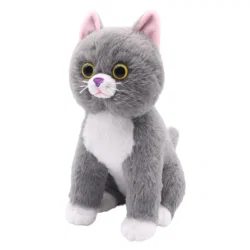Considerations for Choosing Soft Toys
2024-05-30
Soft toys, also known as plush toys or stuffed animals, are a favorite among children and even adults for their comforting and engaging qualities. These toys come in various shapes, sizes, and designs, often resembling animals, cartoon characters, or imaginative creatures. Here’s a detailed look at soft toys, including their benefits, types, and considerations for choosing the right ones:
Benefits of Soft Toys
1. Emotional Comfort:
- Provide a sense of security and comfort to children, helping to soothe anxiety and stress.
- Often become a source of companionship, especially during bedtime or in unfamiliar environments.
2. Cognitive Development:
- Encourage imaginative play, fostering creativity and storytelling skills.
- Help children develop empathy and social skills by role-playing and caring for their soft toys.
3. Motor Skills:
- Handling, hugging, and carrying soft toys help develop fine motor skills and hand-eye coordination in young children.
4. Language Development:
- Children often engage in conversations with their soft toys, enhancing their language and communication skills.
5. Transitional Objects:
- Serve as transitional objects that help children navigate through separation anxiety and new experiences, such as starting school.
Types of Soft Toys
1. Animal Plush Toys:
- Examples: Bears, dogs, cats, elephants, and a wide variety of other animals.
- Benefits: Introduce children to different animals and encourage role-playing and care-giving.
2. Character Plush Toys:
- Examples: Popular cartoon characters, superheroes, movie characters, and mascots.
- Benefits: Connect children with their favorite media characters, promoting imaginative play.
3. Customizable and Interactive Plush Toys:
- Examples: Toys that can be personalized with names or interactive features like sounds, lights, or movements.
- Benefits: Enhance engagement and can be tailored to individual preferences.
4. Educational Plush Toys:
- Examples: Toys with built-in educational features like alphabet letters, numbers, or language learning prompts.
- Benefits: Combine comfort with learning, making education enjoyable for young children.
5. Therapeutic Plush Toys:
- Examples: Weighted plush toys designed to provide calming pressure or toys with soothing textures and scents.
- Benefits: Offer therapeutic benefits for children with sensory processing issues or anxiety.
Considerations for Choosing Soft Toys
1. Age Appropriateness:
- Ensure the toy is suitable for the child’s age, especially for infants and toddlers. Look for age recommendations on the packaging.
- Avoid small parts or loose materials that could pose choking hazards.
2. Safety:
- Choose toys made from non-toxic, hypoallergenic materials.
- Ensure the toy has secure stitching and no sharp edges or hard components.
3. Durability:
- Opt for high-quality toys that can withstand rough handling and frequent washing.
- Check for reinforced seams and robust construction.
4. Washability:
- Select toys that are easy to clean, preferably machine washable, to maintain hygiene.
- Follow the manufacturer’s care instructions to preserve the toy’s condition.
5. Size and Portability:
- Consider the size of the toy in relation to the child’s age and the intended use (e.g., home, travel, daycare).
- Smaller toys are easier for young children to carry, while larger ones may provide more comfort for older children.
6. Allergies and Sensitivities:
- Be mindful of any allergies or sensitivities to certain materials or fillings.
- Opt for hypoallergenic options if necessary.
Popular Soft Toy Brands
1. Ty Inc.: Known for Beanie Babies and Beanie Boos.
2. Gund: Offers a wide range of high-quality, huggable plush toys.
3. Jellycat: Known for their soft, whimsical designs and unique characters.
4. Build-A-Bear Workshop: Allows children to create and customize their own stuffed animals.
5. Steiff: Renowned for their premium, handcrafted teddy bears and plush animals.
Conclusion
Soft toys play a significant role in a child’s development, providing comfort, companionship, and opportunities for imaginative play. When choosing a soft toy, consider factors such as age appropriateness, safety, durability, and the child’s personal preferences. High-quality soft toys can become cherished companions and comforting transitional objects, contributing positively to a child’s emotional and cognitive growth.



